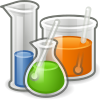
Back Химие ADY Chemie Afrikaans Chemie ALS የጥንተ ንጥር ጥናት Amharic Quimica AN रसायनशास्त्र ANP كيمياء Arabic ܟܝܡܝܐ ARC شيمي ARY كيميا ARZ
| Part of a series on |
| Chemistry |
|---|
 |
Chemistry is the scientific study of the properties and behavior of matter.[1][2] It is a physical science within the natural sciences that studies the chemical elements that make up matter and compounds made of atoms, molecules and ions: their composition, structure, properties, behavior and the changes they undergo during reactions with other substances.[3][4][5][6] Chemistry also addresses the nature of chemical bonds in chemical compounds.
In the scope of its subject, chemistry occupies an intermediate position between physics and biology.[7] It is sometimes called the central science because it provides a foundation for understanding both basic and applied scientific disciplines at a fundamental level.[8] For example, chemistry explains aspects of plant growth (botany), the formation of igneous rocks (geology), how atmospheric ozone is formed and how environmental pollutants are degraded (ecology), the properties of the soil on the Moon (cosmochemistry), how medications work (pharmacology), and how to collect DNA evidence at a crime scene (forensics).
Chemistry has existed under various names since ancient times.[9] It has evolved, and now chemistry encompasses various areas of specialisation, or subdisciplines, that continue to increase in number and interrelate to create further interdisciplinary fields of study. The applications of various fields of chemistry are used frequently for economic purposes in the chemical industry.
- ^ Brown, Theodore L.; LeMay, H. Eugene Jr.; Bursten, Bruce E.; Murphey, Catherine J.; Woodward, Patrick M.; Stoltzfus, Matthew W.; Lufaso, Michael W. (2018). "Introduction: Matter, energy, and measurement". Chemistry: The Central Science (14th ed.). New York: Pearson. pp. 46–85. ISBN 978-0134414232.
- ^ Kofoed, Melissa; Miller, Shawn (2020). Introductory Chemistry. Utah State University: UEN Pressbooks.
- ^ "What is Chemistry?". Chemweb.ucc.ie. Archived from the original on 3 October 2018. Retrieved 12 June 2011.
- ^ "Definition of CHEMISTRY". Merriam-Webster. Archived from the original on 7 August 2020. Retrieved 24 August 2020.
- ^ "Definition of chemistry | Dictionary.com". www.dictionary.com. Archived from the original on 5 March 2016. Retrieved 24 August 2020.
- ^ "Chemistry Is Everywhere". American Chemical Society. Archived from the original on 29 November 2020. Retrieved 1 December 2020.
- ^ Carsten Reinhardt. Chemical Sciences in the 20th Century: Bridging Boundaries. Wiley-VCH, 2001. ISBN 3-527-30271-9. pp. 1–2.
- ^ Theodore L. Brown, H. Eugene Lemay, Bruce Edward Bursten, H. Lemay. Chemistry: The Central Science. Prentice Hall; 8 ed. (1999). ISBN 0-13-010310-1. pp. 3–4.
- ^ "Chemistry – Chemistry and society". Britannica. Archived from the original on 6 May 2023. Retrieved 6 May 2023.